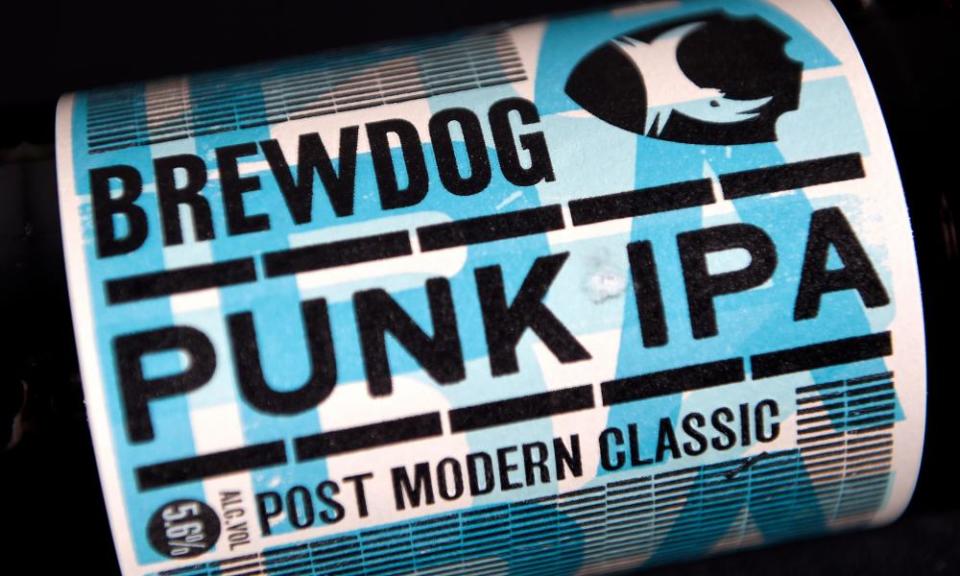BrewDog loses its ethical B Corp certificate

The controversial beer brand BrewDog has lost its status as a B Corp less than two years after joining the scheme, which offers certification of a company’s ethical commitment to the environment, community and staff.
The company, which was recently called hypocritical for running a World Cup ad campaign highlighting Qatar’s poor human rights record despite being criticised by the Unite Hospitality union for the treatment of its own workers, achieved B Corp status last February.
At the time James Watt, the brewer’s outspoken co-founder and chief executive, tweeted his pride at joining a “global community of businesses that meet the highest standards of verified social & environmental performance to help build a better world”.
BrewDog is now a B Corp just like amazing businesses such as @patagonia & @Allbirds
B Corps are a global community of businesses that meet the highest standards of verified social & environmental performance to help build a better world.
A special B Corp beer coming soon! pic.twitter.com/67xgJKFv64— James Watt (@BrewDogJames) February 24, 2021
Watt, who pledged to launch a B Corp branded beer to acknowledge the achievement, said that the accolade was awarded after a “rigorous” year-long scrutiny of the business by B Lab, which assesses companies seeking B Corp status and monitors complaints about member compliance.
The self-styled “punk” brewery, which apologised last year after current and former employees signed an open letter alleging a “culture of fear” in which workers were bullied and “treated like objects”, said at the time of being awarded B Corp status that the company achieved its highest scores in the workers and environment assessment areas.
“BrewDog is no longer a Certified B Corp,” said a spokesperson for B Lab. “B Lab does not comment on companies that are no longer in the B Corp community. I’m afraid I cannot share any further information.”
There are now thousands of businesses globally with B Corp status, including the cosmetics group the Body Shop, the Emma Bridgewater pottery – and the Guardian’s parent company. They are required to sign up to targets such as carbon neutrality and gender pay parity. They have to reverify every three years.
BrewDog is understood to have been subject to an investigation by B Lab after staff submitted complaints following a BBC documentary, Disclosure: The Truth About Brewdog, which looked at the brewer’s workplace culture.
BrewDog has submitted complaints to the TV regulator, Ofcom, about the documentary, which aired earlier this year.
B Lab says it investigates “material, credible and specific claims” against a company on the grounds of either “intentional misrepresentation of practices, policies, or outcomes claimed during a company’s certification process”, or “breaches of the B Corp community’s core values”.
The brewer and pub owner said it remains committed to delivering on its own internal environmental, social and staff commitments, which it set out in a plan called BrewDog Blueprint in May.
“We have decided to step aside from our B Corp certification for the time being,” said Watt in an internal memo to staff on Thursday. “B Lab had requested additional measures from BrewDog and the BrewDog board decided that these were not something we could do at this time. Though we remain committed to the values upheld by B-Lab, we believe our business is currently best served by focusing on the blueprint.”
B Corp companies also have to pay an annual fee on a scale based on sales. Companies with sales of up to £150,000 pay just £1,000 while those making £750m or more have to pay £50,000.
Companies that achieve B Corp status are assessed across five areas: governance, workers, community, environment and customers.
Brewdog scored 81.8 out of a potential 200. To put this in context, the outdoor clothing brand Patagonia, which has impeccable corporate, environmental and social credentials, is one of the highest scoring businesses globally with a score of 151.5.
In the UK, the highest scorer is Oxford-based startup Y.O.U Underwear with 160.5 points.
However, the B Corp programme, which has almost 5,000 brands certified globally, has been criticised as losing its relevance as some large companies with at best questionable credentials have been awarded the accolade.
Earlier this year, a group of 23 B Corp companies led by US fair trade advocacy organisation Fair World Project said the integrity of the programme had been put “at risk” by granting Nestlé-owned Nespresso certification despite allegations of child labour on its coffee farms.
B Corp has also been criticised for its scoring system, which allows a company to achieve certification if its gets at least 80 across the five categories, meaning an applicant can score poorly in one or more areas and still pass.
“Some B Corps are definitely uneasy about some of these big companies with patchy track records joining,” said an executive at one company accredited for a number of years. “Many of those certified are small businesses, run by founders, and have a lot of transparency while some of the big brand names are just looking to burnish their credentials without necessarily looking to save the planet.”
B Lab is running a consultation with members about changing its scoring system so that accreditation can only be awarded by achieving minimum scores in each category.
“We firmly believe no other beer business has our environmental credentials or has invested anywhere near as much as we have in mental health support, team well-being, or training and development,” said Watt. “Nor has any other peer launched such a significant team share programme or profit-sharing scheme.”

 Yahoo Finance
Yahoo Finance 